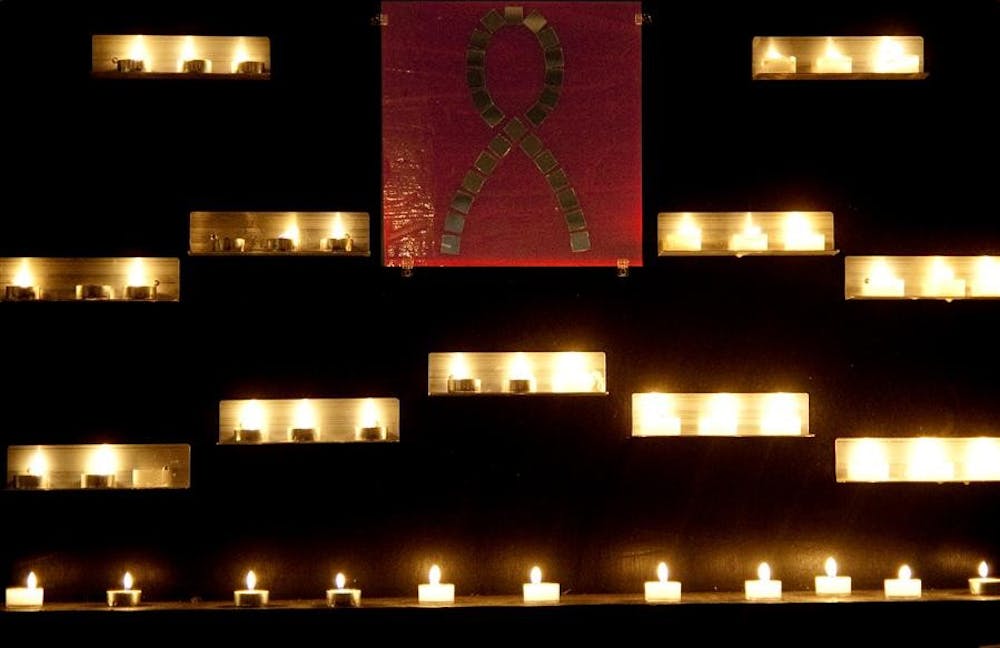Drums supplemented an undulating roar of fellowship Monday in the Fountain Square ballroom downtown during the Community AIDS Action Group’s Ceremony of Celebration and Remembrance.
Despite the bright bulbs jutting out from several chandelier holsters, the lighting was still dim enough to suit the occasion, that was organized in memory of World AIDS Day, which is today.
Chocolate cupcakes with vanilla frosting and edible red ribbons were served to guests in crimson pencil skirts and V-neck sweater-and-button-up combinations.
Guests were mingling at round glass tables shrouded in fresh white linen tablecloths to songs such as “Lean On Me,” and “Seasons of Love” from the Broadway hit musical “Rent.”
At the event, the point was made that HIV/AIDS doesn’t have a face. It could be anyone, from the student on the 9 bus sipping a Polar Pop to an avid runner to the firefighter who rescues kittens and saves lives.
But, even in the new age of cocktail drugs that prevent the jaundiced skin and sunken eyes often caused by the deterioration AIDS can cause to one’s body, the disease still affects everyone.
Just ask Vicci Laine, a local resident and HIV/AIDS fundraiser and activist.
It took an HIV scare in 1991 from an unfaithful lover whom she trusted enough to neglect condom usage to change her world. He was sleeping with someone infected with HIV via intravenous drug abuse.
Though Laine’s test came back negative, she has since forgiven her ex-boyfriend’s infidelity and dedicates her life to letting other people know about the dangers of such risky, complacent behavior.
“People think the threat is over, you take meds (and) you live forever,” Laine said, shaking her head. “Well, that’s a myth. It’s not affecting specific communities like people once thought. It’s a huge threat to the world.”
Another motivator for Laine’s work is seeing many of her friends live and die of AIDS complications, including her best friend.
She, like all the other people one would least expect to be affected by the fatal disease, was a national beauty queen. She died at 31.
“She went from being a beauty queen to losing her eyesight, having hair loss and having a leg amputated,” Laine said about her friend, whom she also described as a fighter. “It’s painful for everyone around to see that, not just the victim, though they are in the most pain,”
But, because of the stigma still associated with HIV and AIDS – that it is largely an issue only reaching the GLBT community, Laine said her friend kept her sickness a secret for a long time.
Laine said that she could relate to this because when she went through her scare, for the two weeks she waited for her test results to come back, it felt like “waiting on the word of a death sentence.”
And if that were true, Laine said, how does one go about telling their mother, brother, sisters and friends?
“I didn’t suspect a thing was wrong with my friend until her partner died of the disease,” Laine said. “After he died, she made a quick progression from being fine to very ill.”
Despite Laine’s efforts to change the opinions of skeptics with her story, sometimes when speaking to classes, she still said she sees that one student in the back of the room, arms folded in apathy. This look to her says, “I’m just here for extra credit.”
Senior Eric Schubert is one student who doesn’t mesh with such an attitude.
During his senior year in high school, Schubert took on an internship with Wishard Memorial Hospital in Indianapolis.
Schubert worked in the emergency room, where he said he saw everything from homeless people to diseases most common people defeat at childhood with vaccinations.
Schubert had to undergo an HIV blood examination and wait for two days.
He spent those days watching movies such as director Larry Clark’s “Kids” and the famed Tom Hanks film “Philadelphia.” Both deal with the consequences and the hardships of living with AIDS in urban populations.
Schubert said he also reflected on the times he was having unprotected sex with girlfriends.
“I mean they were girlfriends, and I felt safe, but I still had that feeling in the back of my mind, like ‘what if’ that happened to me?” he said.
Another wake-up call came from a semester taking the popular human sexuality course through the School of Health, Physical Education, and Recreation. Like most students enrolled in the class at any given time, Schubert was one of many who sat before an HIV/AIDS panel.
“One of the guys was from Martinsville, Indiana, and he admitted to sleeping with hundreds of people,” he said. “He now feels like it’s the biggest mistake of his life, because he’s in pain all the time and he has to take 25 pills a day to cope, but even the side effects still make him sick.”
Schubert, who is a nursing student, said it is because of people like that panelist who influence him to maintain an open mind about the widespread effects of HIV/AIDS.
“What’s goin’ on out there is bad news and nasty stuff. There is no cure for that,” he said. “And as educated as many people are, you’ll always have those people that don’t use their head, but use what’s in their pants.”
Local and IU communities unite to commemorate World AIDS Day

Get stories like this in your inbox
Subscribe





